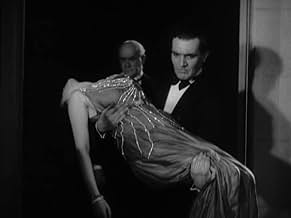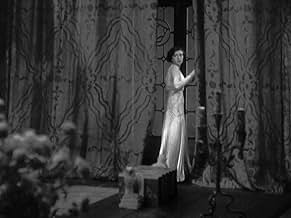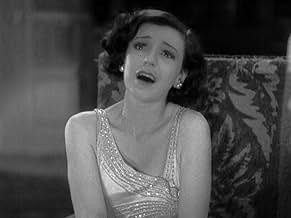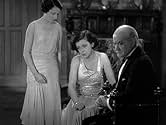VALUTAZIONE IMDb
5,7/10
3815
LA TUA VALUTAZIONE
Aggiungi una trama nella tua linguaAn old traditional family and a modern family battle over land in a small English village and almost destroy each other.An old traditional family and a modern family battle over land in a small English village and almost destroy each other.An old traditional family and a modern family battle over land in a small English village and almost destroy each other.
- Regia
- Sceneggiatura
- Star
Rodney Ackland
- Man at Auction
- (non citato nei titoli originali)
Ivor Barnard
- Man at Auction
- (non citato nei titoli originali)
Wally Patch
- Van Driver
- (non citato nei titoli originali)
Recensioni in evidenza
I feel many writers and critics, David Sterritt, Donald Spoto to name but two are too dismissive of this movie. With the technological restrictions of the very early talkie, Hitchcock as used his artistry to compose fluidity and cinematic suture to a rather stolid Galsworthy play. Already mentioned are the innovative zip pans, he also has intelligent use of dissolve, symbolism aplenty within montage sequences, sheep v horn (Hillcrest v Hornblower). The juxtaposition in the opening sequence of the car and the horse sets the theme beautifully. Occasionally there is daring reverse shots of the same objects defying the 180 degree rule, especially noticeable as we break into the proscenium arch of theatre.
Technical crudities, print/sound deficiencies and dated acting styles taken into consideration, "Skin Game" still has innovative (for the time) camera techniques and thematic ambiguity (who is right and who is wrong? Who are the true villains of the story?) and is generally better than other, more "typical" Hitchcock films of the period, like "Murder!" from 1930.Edmund Gwenn is terrific and Phyllis Constam is quite sexy. (**1/2)
The early 30s were a time of experimentation for Hitchcock, with theme as much as with technique. After discovering that the crime thriller was his forte with Blackmail and Murder!, his at the time zigzagging career lead him to attempt a talkie drama adapted from a fairly mediocre stage play concerning a feud between the families of an aristocrat and an entrepreneur.
In attempting a straight ahead drama without any major thriller elements, Hitchcock nevertheless employs all the techniques he had been perfecting in his earlier crime pictures dynamic editing, a focus on the psychology of guilt and fear, as well as some of the sound techniques of his previous talkies. Sometimes it works, other times it doesn't. He tries to inject some tension into an auction scene with whip pans and quick editing, which is a fairly good display of technique but we don't really care enough about the outcome of the bidding to get really drawn in at this point.
For some of the more talky scenes, Hitchcock tries to move beyond the story's theatrical roots by focusing on reactions and having dialogue take place off screen. This helps to give weight to the second half of the film. In particular, Hitch's dwelling on the face of Chloe, the innocent victim of the feud, makes the audience feel sympathy for her character, which in turn makes the climactic scenes work and prevents them from slipping into ridiculous melodrama (which the stage version may well have done). For some of the more subdued scenes, Hitchcock preserves an unbroken take but still takes the focus on and off different characters by smoothly dollying in and out. This same method would be used by Laurence Olivier when he began directing Shakespeare adaptations in the 1940s. However, too many of the dialogue scenes in The Skin Game are simply a lot of panning as the camera tries to keep up with extravagant theatrical performances.
This is a fairly good go at theatrical drama for Hitchcock, but it was made at a time when he was coming to realise not only his strength in the suspense thriller, but his weakness in (and utter distaste for) every other genre. He was probably beginning to look at this kind of project as a rather dull waste of time, and definitely at odds to his sensibility. As an example, this is one of the very few Hitchcock pictures to take advantage of natural beauty, and yet he makes this aspect a victim of his playful irony, by taking his most beautiful countryside shot, then pulling out to reveal it is merely a tiny picture on a sale poster, surrounded by Hornblower and his cronies laughing over the deal they have just made.
The Skin Game is rarely gripping, but at times it is powerful, and in any case it has a short enough running time to prevent it from getting boring. Hitchcock however was looking now to have more fun with crime and suspense, and this sense of the dramatic (not to mention a sense of genuine sympathy for the victim) would not return until his later Hollywood pictures, and even then only occasionally.
In attempting a straight ahead drama without any major thriller elements, Hitchcock nevertheless employs all the techniques he had been perfecting in his earlier crime pictures dynamic editing, a focus on the psychology of guilt and fear, as well as some of the sound techniques of his previous talkies. Sometimes it works, other times it doesn't. He tries to inject some tension into an auction scene with whip pans and quick editing, which is a fairly good display of technique but we don't really care enough about the outcome of the bidding to get really drawn in at this point.
For some of the more talky scenes, Hitchcock tries to move beyond the story's theatrical roots by focusing on reactions and having dialogue take place off screen. This helps to give weight to the second half of the film. In particular, Hitch's dwelling on the face of Chloe, the innocent victim of the feud, makes the audience feel sympathy for her character, which in turn makes the climactic scenes work and prevents them from slipping into ridiculous melodrama (which the stage version may well have done). For some of the more subdued scenes, Hitchcock preserves an unbroken take but still takes the focus on and off different characters by smoothly dollying in and out. This same method would be used by Laurence Olivier when he began directing Shakespeare adaptations in the 1940s. However, too many of the dialogue scenes in The Skin Game are simply a lot of panning as the camera tries to keep up with extravagant theatrical performances.
This is a fairly good go at theatrical drama for Hitchcock, but it was made at a time when he was coming to realise not only his strength in the suspense thriller, but his weakness in (and utter distaste for) every other genre. He was probably beginning to look at this kind of project as a rather dull waste of time, and definitely at odds to his sensibility. As an example, this is one of the very few Hitchcock pictures to take advantage of natural beauty, and yet he makes this aspect a victim of his playful irony, by taking his most beautiful countryside shot, then pulling out to reveal it is merely a tiny picture on a sale poster, surrounded by Hornblower and his cronies laughing over the deal they have just made.
The Skin Game is rarely gripping, but at times it is powerful, and in any case it has a short enough running time to prevent it from getting boring. Hitchcock however was looking now to have more fun with crime and suspense, and this sense of the dramatic (not to mention a sense of genuine sympathy for the victim) would not return until his later Hollywood pictures, and even then only occasionally.
"The Skin Game" is one of Alfred Hitchcock's earlier sound pictures, and although the story held potential, it is a rather bland film despite a couple of good Hitchcock touches.
The story centers on a rivalry between two neighboring families who have very different views on the future of their community. Mr. Hornblower (Edmund Gwenn) wants to see the land developed and used for factories and businesses, while the Hillcrest family wants to see the traditional homes and countryside preserved. The resulting conflicts hold some real potential, and lead to some good moments as the families try to outwit each other in a "skin game", but the movie as a whole is never really very compelling.
It's hard to pinpoint exactly why this is not a better film. There are no big names in the cast, but Hitchcock made several fine movies with just this sort of cast. Gwenn is good in his role, and Phyllis Konstam is believable and sympathetic as his daughter-in-law whose troubled past eventually provokes a crisis between the two families.
Perhaps Hitchcock stayed too close to the play on which the film is based (it does have a bit of a stage-bound feel), or perhaps for once he did not have a strong sense of the material's potential.
Hitchcock saved his best for the movie's most important scene, when a crucial parcel of land is auctioned off. The auction scene, and a confrontation afterwards between the main characters, is well-done with some good twists.
There are also some nice ironic touches at the end.
Hitchcock fans should still watch "The Skin Game" at least once, to notice the ways that the director's usual touch can be seen, but this movie may not be of much interest to others.
The story centers on a rivalry between two neighboring families who have very different views on the future of their community. Mr. Hornblower (Edmund Gwenn) wants to see the land developed and used for factories and businesses, while the Hillcrest family wants to see the traditional homes and countryside preserved. The resulting conflicts hold some real potential, and lead to some good moments as the families try to outwit each other in a "skin game", but the movie as a whole is never really very compelling.
It's hard to pinpoint exactly why this is not a better film. There are no big names in the cast, but Hitchcock made several fine movies with just this sort of cast. Gwenn is good in his role, and Phyllis Konstam is believable and sympathetic as his daughter-in-law whose troubled past eventually provokes a crisis between the two families.
Perhaps Hitchcock stayed too close to the play on which the film is based (it does have a bit of a stage-bound feel), or perhaps for once he did not have a strong sense of the material's potential.
Hitchcock saved his best for the movie's most important scene, when a crucial parcel of land is auctioned off. The auction scene, and a confrontation afterwards between the main characters, is well-done with some good twists.
There are also some nice ironic touches at the end.
Hitchcock fans should still watch "The Skin Game" at least once, to notice the ways that the director's usual touch can be seen, but this movie may not be of much interest to others.
Early Hitchcock drama that proves with every film, he was experimenting. Here, he uses zip pans moving from person to person during a frantic auction scene. This technique wouldn't become commonplace for another thirty years with the introduction of cinema verite. Other than that, this is a rather ordinary drama.
Lo sapevi?
- QuizThe title comes from a slang phrase for "an unscrupulous business operation". Although this movie is British, the term is considered American and dates back to just after the American Civil War (1861-1865). It is not to be confused with the similar-sounding aphorism "to have skin in the game", which refers to someone who has a stake, financial or emotional, in a business deal, wager, or other situation.
- Citazioni
[last lines]
Mr. Hillcrist: What is it that gets loose when you start a fight, and makes you what you think you're not? Begin as you may, it ends in this skin game! Skin game! When we began this fight, we'd clean hands. Are they clean now? What's gentility worth if it can't stand fire?
- ConnessioniFeatured in Paul Merton Looks at Alfred Hitchcock (2009)
- Colonne sonoreHabanera
(1875) (uncredited)
from "Carmen"
Music by Georges Bizet
Libretto by Henri Meilhac and Ludovic Halévy
Excerpt whistled by Jill Esmond
I più visti
Accedi per valutare e creare un elenco di titoli salvati per ottenere consigli personalizzati
Dettagli
- Data di uscita
- Paese di origine
- Lingua
- Celebre anche come
- The Skin Game
- Luoghi delle riprese
- Elstree Studios, Borehamwood, Hertfordshire, Inghilterra, Regno Unito(Studio, destroyed during World War II and later rebuilt)
- Azienda produttrice
- Vedi altri crediti dell’azienda su IMDbPro
- Tempo di esecuzione1 ora 25 minuti
- Colore
Contribuisci a questa pagina
Suggerisci una modifica o aggiungi i contenuti mancanti

































